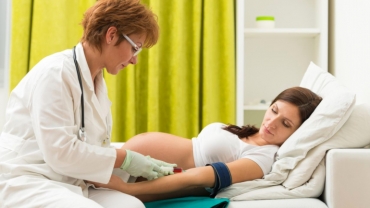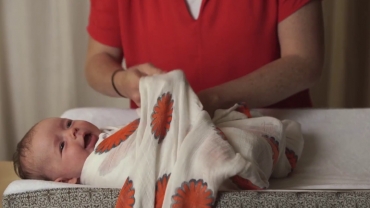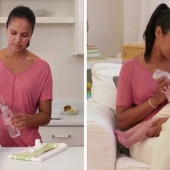Most parents that I see in the office have questions about starting solid foods for their baby, like when should I start and which foods are best to start with, what about food allergies, and will nursing or bottle feeding change? So, let's talk about it.
Somewhere between four and six months of age or when your baby is showing signs of being ready, you'll want to start pureed foods. Babies don't need anything other than breast milk or formula up to four months of age.
Have your baby sit with you while you are eating, and look for the following signs of being ready: your baby holds up her head, she can sit up, she's showing interest in foods, and if you put a spoonful of food in her mouth, she doesn't spit it all out.
Any food can be a first food. Cooked vegetables, cereals, and soft fruits are good ones to start with. And meats, cottage cheese, and yogurt are also good. Whatever you choose, most babies do best with a very smooth texture.
All babies should be fed from a spoon or from your finger. We don't recommend putting solid food, like rice cereal, into a bottle. Many families offer breast milk or formula and then some solid foods and then more breast milk or formula.
Start with just a couple of teaspoons each time. Increase to about a quarter cup of food two to three times per day during the first couple of months that you are introducing foods. The process is messy, so be ready.
Is your baby eagerly moving toward the spoon and opening her mouth? Does she fuss when you take too long between spoonfuls? Then she's hungry; keep on feeding. Is she turning her head away, spitting food out, or putting her hand over her face? Then your baby is full. Stop feeding and put the food away. Make sure you honor your baby's hunger and fullness so she learns to eat just what she needs.
Don't get pushy or you'll spoil the fun for both of you. Introduce new foods one at a time so that if your baby has a reaction, you will have a good idea of what caused it. It's fine to add a new food every three to four days, and the latest research says it's okay to include peanut butter, fish, and eggs before 12 months of age.
If your baby is allergic to a food, you will likely know by the second or third time you feed it to her. Signs of an allergy might be rash, vomiting, diarrhea, bloody stools, or wheezing. If you notice any of these things, hold that food and talk it over with your provider.
Jarred baby food from the store can be convenient and easy. Also, you can mash soft foods like bananas, cooked sweet potatoes, and avocado with a fork, or use a blender or food processor to puree foods like oatmeal, cooked pears, and apples.
At the beginning, mix in breast milk or formula to make it thin and easy to swallow. Babies and toddlers may take 20 or more times trying a new food before they start to accept it, so don't assume if your baby pushes a food away that she will never like it.
Sometimes mixing a favorite or familiar food with a new food will make it easier. Babies who experience a wide variety of tastes and textures early in life will continue to eat and enjoy a wider variety of foods as they get older.
It's important to remember that introducing solid foods, at this point, is not about getting lots of food into your baby. It's about helping her learn to love different foods and different textures.
Breast milk or formula is still the main source of nutrition until eight or nine months of age. Continue to feed on demand, and expect at least four to six breast or bottle feedings per day. Most babies will go three to four hours between feedings and many will sleep through the night. Don't switch to whole cow's milk until after the first birthday.
So, let's summarize. Start solid foods when your baby can sit up on her own independently and is showing interest or around four to six months of age. Any food can be first. The right texture is most important. Add a new food every three to four days to watch for any signs of allergy. Continue breast or bottle feeding on demand, or at least four to six times per day up until 12 months of age. Keep trying foods that your baby doesn't like.
- 52 views













